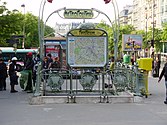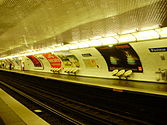Pasteur station (Paris Métro)
| Paris Métro station | ||||||||||||||||
 Line 6 platforms at Pasteur | ||||||||||||||||
| General information | ||||||||||||||||
| Location | 15th arrondissement of Paris Île-de-France France | |||||||||||||||
| Coordinates | 48°50′34″N 2°18′46″E / 48.842836°N 2.312681°E | |||||||||||||||
| Owned by | RATP | |||||||||||||||
| Operated by | RATP | |||||||||||||||
| Other information | ||||||||||||||||
| Fare zone | 1 | |||||||||||||||
| History | ||||||||||||||||
| Opened | 24 April 1906 (Line 6) 5 November 1910 (Line 12) | |||||||||||||||
| Services | ||||||||||||||||
| ||||||||||||||||
| ||||||||||||||||
Pasteur is a station on lines 6 and 12 of the Paris Métro in the 15th arrondissement. The platforms for both lines are situated underground, although line 6 becomes elevated as it approaches northwest end of the station. Nearby are the Pasteur Institute (research facility) and the Lycée Buffon (school).
Location
The station is located at the intersection of Rue de Vaugirard and Boulevard Pasteur. On Line 6, the station is the first one underground on line from Charles de Gaulle–Étoile, after a long viaduct starting at Passy metro station.
History

The station opened on 24 April 1906 following the extension of line 2 Sud from Passy to Place d'Italie. On 14 October 1907 line 2 Sud became part of line 5. On 12 October 1942 the section of line 5 between Étoile and Place d'Italie, including Pasteur was rerouted from line 5 to line 6 in order to separate the tracks underground, as well as was elevated in certain sections (because these sections more vulnerable to air attack during World War II).
The line 12 platforms opened on 5 November 1910 as part of the original section of the Nord-Sud Company's line A between Porte de Versailles and Notre-Dame-de-Lorette. On 27 March 1931 line A became line 12 of the Paris Métro.
The station is named after the Boulevard Pasteur, which is named after Louis Pasteur (1822–1895) renowned French microbiologist and chemist.
It was the location of the Barrière de Vaugirard, a gate built for the collection of taxation as part of the Wall of the Farmers-General; the gate was built between 1784 and 1788 and demolished during in the nineteenth century.[1][2][3][4]
The station was seen in the film Alice et Martin when the character of Alice (played by Juliette Binoche) looks out the window of a train as it descends underground.
Station layout
| Street Level |
| B1 | Mezzanine for platform connection |
| Line 6 platform level | Side platform, doors will open on the right | |
| toward Charles de Gaulle – Étoile | ← | |
| toward Nation | | |
| Side platform, doors will open on the right | ||
| Line 12 platform level | Side platform, doors will open on the right | |
| toward Mairie d'Issy | ← | |
| toward Front Populaire | | |
| Side platform, doors will open on the right | ||
Gallery
-
Street-level entrance at Pasteur
-
Line 6 platforms at Pasteur
-
Line 12 platforms at Pasteur
-
MF 67 rolling stock on Line 12 at Pasteur
References
- ^ "Barrière de Vaugirard, picture" (in French). Bibliothèque nationale de France. Retrieved 19 October 2009.
- ^ "Barrière de Vaugirard, picture" (in French). Bibliothèque nationale de France. Retrieved 19 October 2009.
- ^ "Barrière de Vaugirard, picture" (in French). Bibliothèque nationale de France. Retrieved 19 October 2009.
- ^ "Barrière de Vaugirard" (in French). Bibliothèque nationale de France. Retrieved 19 October 2009.





